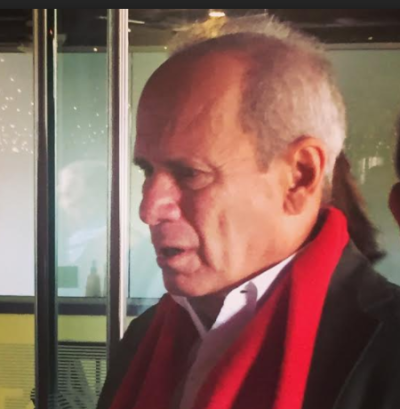Who Lost the PawSox?
Saturday, August 18, 2018
Get ready, the finger pointing has already started. The minor league affiliate of the Boston Red Sox is packing up and moving to Worcester, MA.
The political blame game has begun. The implications in Rhode Island are profound — the embarrassment of the loss of the team to Worcester — could have implications for the governor’s race and for key legislative battles.
GoLocal Takes a Look at Five Factors That Led to the PawSox’s Move to Worcester — See Below
GET THE LATEST BREAKING NEWS HERE -- SIGN UP FOR GOLOCAL FREE DAILY EBLASTGovernor Gina Raimondo’s top Democratic primary challenger Matt Brown was quick to blame Raimondo’s failure.
“This is a sad day for Rhode Islanders. We’re losing a cherished institution that has been a big part of life for so many of us. It’s disappointing, but not surprising, that Governor Raimondo is trying to shift the blame. But the fact is: this is what happens when we have a governor who is more focused on out-of-state fundraising than being here at home, working for the people of Rhode Island. Rhode Islanders deserve better," said Brown.
Meanwhile, top Senate leaders on Friday were blaming House leadership.
President of the Senate Dominick Ruggerio said, “The Senate did everything it could to pass responsible legislation to keep the PawSox in Rhode Island. I am very grateful for the commitment and hard work of Chairman Conley and the Senate Finance Committee. The committee was extremely diligent, holding over 30 hours of public hearings during an exceptionally open and transparent process. In recognition of the opportunity before us to revitalize downtown Pawtucket while preserving a Rhode Island institution, the Senate voted in the opening weeks of session this January to pass a responsible ballpark plan.”
“The Senate legislation was fair to the team and beneficial to state and city taxpayers. I am certain that the team would have stayed in Pawtucket had the Senate bill passed into law. I am proud of my colleagues in the Senate for their work on the ballpark proposal.”
Ruggerio was not being subtle in his claims that it wasn’t his fault. But, Ruggerio’s bill often looked like a public works funding project and had little protection for taxpayers if the project went south. The Senate bill placed tremendous financial burden on the City of Pawtucket — a city with little margin for financial uncertainties or new obligations.
GoLocal Takes a Look at Five Factors That Lead to the PawSox’s Move to Worcester — See Below
Related Slideshow: Who Lost the PawSox? August 2018
Related Articles
- UPDATED: Grebien Blasts Mattiello and House Over PawSox Failure, Legislation Posted for Thursday
- End of the Session PawSox Battle Continues in House Finance Hearing Tuesday Night
- EDITORIAL: RI Politics at its Worst — Last Minute Legislation Moving For PawSox Owners
- “This is What the Average Rhode Islander Doesn’t Like,” Says Giarrusso of PawSox Deal on LIVE
- Dickinson Blasts Raimondo Over “Failure to Provide Leadership” on PawSox Legislation
- RI House Approves Record $9.6B Budget, PawSox Bill Posted for Tuesday Hearing, Frias Awaits
- EDITORIAL: Just “13% Strongly Support” Public Financing for PawSox Stadium
- GoLocal Unveiling Major Statewide Poll - Gov’s Race, PawSox, Economy and More
- Bishop: PawSox or Not to Sox – That is The Question
- GoLocal Statewide Poll: Just 13% of Rhode Islanders ‘Strongly Support’ Funding the PawSox Stadium
- $18M Developmental Disability Funding Restored, No PawSox in $9.5B House Budget Unveiled Friday
- PawSox Legislation Headed to Raimondo, Brown Calls for Veto
- Whitcomb: Border Wars; Ninth Inning for the PawSox? Kochs Derail Public Transit; Small Real Retail
- VIDEO: Pawtucket Councilman Vitali on PawSox Delegation City Hall Visit on Friday
- Worcester to Make PawSox Announcement, Grebien Tells GoLocal Pawtucket Will Retain Team
- LIVE VIDEO: Worcester’s PawSox Press Conference
- PawSox Sign Letter of Intent to Build a Triple-A Ballpark in Worcester
- PawSox Edge Closer to Worcester, What Will Be the Fallout in RI
- Central Falls, PawSox to Honor Baseball Hall of Famer Hemond
- UPDATED:Raimondo Signs PawSox Funding Bill — Costs $83M More, Draws Fire from Brown
- PAWSOX: “Snatching Defeat from the Jaws of Victory” - Guest MINDSETTER™ O’Neill
- Moderate Party’s Gilbert Blasts Raimondo, Mattiello Over Use of Eminent Domain for PawSox Stadium
- Did the PawSox Just Tweet that they Reject the Mattiello Legislation?
- Worcester Chamber Celebrates PawSox Move to Worcester














